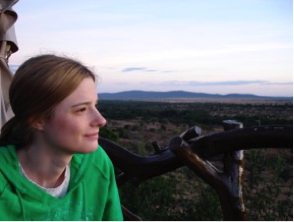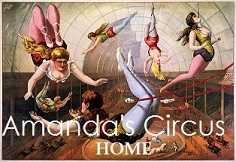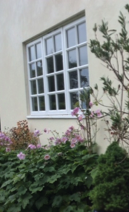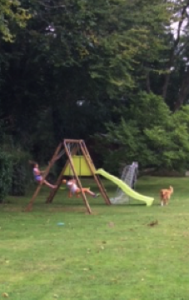Talking to Louise Taylor
Louise Taylor writes fiction – short stories and novels, and travel articles and poetry. Her poetry will be part of 10 Days.
He waits by the side gate, the one that’s beneath the head gardener’s dignity. A paper bag holding the remnants of sixpence’s-worth of monkey nuts is scrunched into his pocket and rests warmly against his thigh. Eva likes monkey nuts. She cracks the shells between her teeth and spits the pieces out onto the ground. None of the other young ladies do that.
A: This is an extract from the novel that Louise is currently writing.
Louise, I love the way your writing combines big themes such as women’s suffrage, the injustice of the class system with the intimacies of family life and one can almost taste your wonderfully lyrical, perfectly-balanced sentences. When you’re writing fiction, do you find that the characters come first or the theme?
L: Actually, it tends to be the place that comes first. Sometimes the theme is closely linked to that (for example, I’ve written a lot about East Africa and theme and place always went hand-in-hand for me). Characters, however, always seem to arrive in my head last, which perhaps isn’t surprising coming from a chronically late person.
A: Interesting. Are the places from imagination or experience? What fascinates you about East Africa?
L: Experience, albeit sometimes with an imaginary spin. I can’t quite put my finger on what it is about East Africa that’s got me by the scruff of the neck and won’t let me go. At first I attributed it to a childhood diet of David Attenborough documentaries but having now visited the region more than once, I know it’s more than that. It’s the space, the history – both recent colonial and prehistoric – and the increasingly difficult juxtaposition of a growing human population with the famous wildlife.
A: Why do you think it is that you’re attracted to such large ideas? Do you think your background, as a barrister and as a mother, influence this?

L: Hmm, I’ve not thought about it in that way before but perhaps it’s my way of kicking back a bit against the law and motherhood, both of which seem very concerned with the minutiae of things.
A: I suppose it must depend on your point of observation. So how did you explore the theme of ‘Chalk’? Do you take a different creative approach when writing poetry?
L: Much of what I write is inspired by the natural world so, for me, ‘Chalk’ conjured up thoughts of the South Downs and all the many people and creatures that have trampled it over the ages.
My first chalk-related writing was accidental when my children found a dead collared dove in the garden and wanted to bury it. I wrestled for what seemed like ages with a spade, digging down through the chalky soil to create this grave and then wrote a poem about it. Only once I’d finished did I realise it was a ‘chalk’ piece. That’s typical of how I write poetry; I don’t plan poems in the same way I do fiction (or non-fiction). They come as they are and I take what I get. That’s not to say I don’t edit and re-write; it’s just that to get to that point I have to relinquish any attempt at control.
A: And I suppose you get a sense of when it’s time to stop re-writing a poem. What are the signs that tell you it’s finished?
L: When it sounds right when I read it aloud. This can take minutes or it can take months but usually somewhere in between.
A: You mentioned that you plan fiction but not poetry. Is this because the form is shorter?
L: I don’t think it’s because it’s shorter; I think it’s because it comes from a different place. That probably sounds pretentious; and maybe it makes more sense if I admit that I sometimes think of writing poetry as being like dreaming while I’m awake.
A: I wonder if the writing process becomes less surprising for you, when you plan?
L: It doesn’t become less surprising. It starts out that way but that truism about the best laid plans of mice and men becomes more and more sonorous as I go on. That’s the thing about fiction, isn’t it, particularly novels: you can plan all you like but once a character has developed into a real person you simply can’t make them do something just to fit your grand plan – or not if you want to write a credible novel anyway.
A: Would you say the different approaches equate to a case of creative freedom versus control?
L: Not exactly. They’re not opposing forces, more different facets of the same thing and I can’t have one without the other. They just don’t always come into play at the same time in every piece of work.
A: Do these wonderful twining, lyrical sentences work in a similar way, do they come fully formed or do they evolve in the process of re-writing?
L: Ha! On a good day – a very, very good day – I might be lucky enough to have a fully formed one appear first time on the page but mostly, yes, they change for the better gradually over the course of many re-writes. What I need to do is come up with some way of remembering the lines that pop into my head just as I’m falling asleep at night. Those always seem excellent. It’s unfortunate that fumbling for my phone to try and tap them into a note is an equally excellent way of ensuring I’ve forgotten them by the time I’ve got to the right screen. And, for some reason, my husband doesn’t like me disturbing him by switching on the light to scrawl in a notebook.
A: Haha! I’ve discovered I can write in the dark. Trouble is, last night I found I was writing with the wrong end of my pencil. So, what are you working on now?
L: A novel set in the early twentieth century, with much of the action taking place in my home town of Birkenhead. The “elevator pitch” is still under construction – and may take longer than the first draft of the novel itself did – but it encompasses women’s higher education, a beautiful garden (and a gardener who loves it very much) and an abortion trial.
A: It’s a story I’d love to read. We all know how difficult it is to get a novel published these days, and that big sums of money are rarely earned by writers of literary fiction, given this, what is it that drives you to take on such a huge commitment as the novel.
L: Only that I want to because I have stories that I want to tell. It’s a rather self-indulgent hobby really. I shan’t deny it would be lovely to have people want to read them but primarily I write only for myself. And I’d write even if I had categorical assurance that no-one apart from me would ever read any of it.
A: Many people, women especially, have to juggle their world in order to find space to write. Where do you write?
L: My desk is in my children’s playroom (I make them keep the room tidy with the threat that if they don’t, I’ll turn it into my study). Obviously I only write when they’re not in the room: re-enactments of Frozen and lengthy ukulele-playing sessions have unhelpful effects on both my concentration and my temper. If I’m at home by myself I tend to use my husband’s desk, which is in an alcove in the dining room. Sitting there means I don’t have to worry about the dog, who likes to be in the same room as me, dismembering an important Barbie doll and, at this time of year, I can stare at the hollyhocks growing outside the window whenever I need to procrastinate.
A: It seems to me that procrastination is an important part of the process, not least because we can communicate with other writers through social media – it’s become known as the writers’ water cooler, hasn’t it. What is your writing routine?
L: My writing routine varies depending on the time of year. During school holidays I only work at night, usually between about ten and midnight, and only if I’m not completely shattered (I rarely manage two nights in a row). On my days at home when the children are at school, I sit down with a cup of tea at my desk about ten, after drop-off and dog-walking, read the news, fiddle about on Facebook, Twitter and Mumsnet, wish I could turn the router off (I can’t: my husband works from home), get down to some serious writing just as my husband is knocking off for lunch and hoping I’ll be doing likewise and then write in a furious panic for about two hours until it’s time to collect the children and begin choreographing that day’s after-school activities.
A: You’ll be performing your poetry at Loose Muse at Winchester’s Discovery Centre on Monday 14th September? What can we expect hear?
L: At the moment, I have absolutely no idea. I’ll probably take along a small portfolio of pieces and decide on the night, depending on the mood in the room and what people have read during the open mic session.
A: You’re brave! Thank you Louise, it’s been fascinating finding out about your writing process. I hope the Loose Muse audience is perky. It’s an exciting prospect and I’m really looking forward to hearing you read.
Louise Taylor swapped life at a City law firm initially for an MA in Creative Writing and then for the uncertainties of combining freelance work with novel writing and poetry. She says she is somewhat poorer as a result but much happier.
Louise is a member of Taverners, the Winchester-based writers’ group, and her poetry will be published in the anthology Chalk Legends this autumn. You can visit her blog at nofrigatelikeabook.




